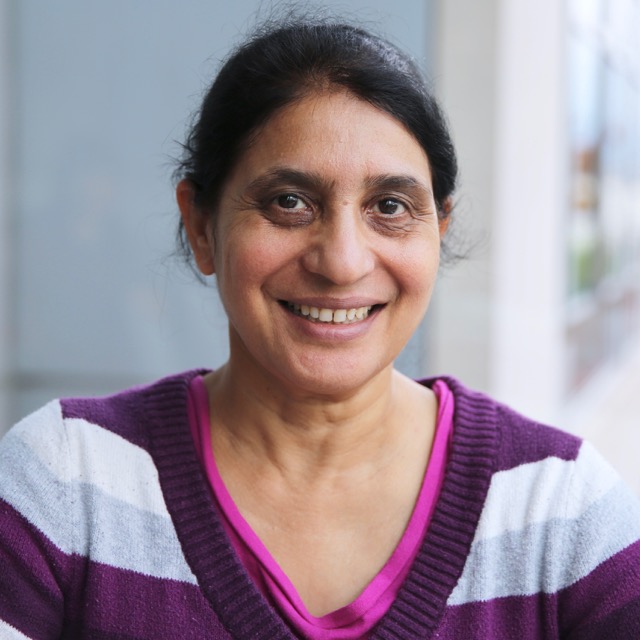What got you interested in science?
A good mentor is essential to sparking interest in any subject. I once had a science teacher who didn’t believe that her students could understand the complexities of science, but I also had a relative whose enthusiasm and teaching technique motivated me to study the subject more deeply. When my relative taught me the anatomy of the heart, I was inspired to pursue biology. At the time it was traditional for women to study home science in college, but my family was very supportive in allowing me to explore my interests
Where did you go to school and what brought you to ISB?
I completed my studies in India. I initially wanted to become a doctor, so I did my undergrad in biology. My scores for the pre-med exam were not high enough so I applied to a molecular biology program. Molecular biology is very competitive, so as a backup I applied to botany as well. Ultimately, I ended up doing my masters and Ph.D. in botany. After I completed my education I spent a year teaching botany in a community college and then moved to the United States.
Once I came here, I began to look for botany related jobs but could not find any nearby. I looked for job openings at UW and started to work as a volunteer on the Human Genome Project in the Hood Lab (this was before ISB existed). I was eventually hired as a research technologist in the molecular biotechnology department, where I was given the opportunity to process clone libraries and generate sequence data, analyze and assemble it. After 6 months, Dr. Lee Hood left UW to form his own institute and the lab moved with him.
What made you choose botany?
I really enjoyed learning about the structures of the plants and flowers that I studied. I liked plant physiology, but molecular biology will always be my favorite.
Do you ever use the skills that you used while in botany?
The scope of a Ph.D. is usually narrow, but the skills I learned were transferable to the projects I do now. When I joined the Hood Lab in 1999, my job was to purify DNA from bacterial cultures, setting up sequencing reactions and loading them on DNA sequencer machines. These tasks require knowledge of experiment design, applying new protocols and technologies, interpreting the results, and troubleshooting any issues– all of which I learned during my Ph.D. The basic skills I learned in my Ph.D. really helped me do well here.
What projects have you worked on at ISB?
After moving to ISB, I worked on Chromosome 15 project for 2.5 years. Due to low funding, I transferred myself to another project with Dr. Nitin Baliga (Scientist) in the Hood lab. The project was obtaining a system-wide understanding of the regulatory network of halophilic archaea Halobacterium salinarum. Some of the subprojects included halobacterium response to transition metals and oxidative stress response. I also worked with Saccharomyces to study Adaptive prediction (AP) behavior.
Currently, I am working on 2 projects.
1) To understand the complexity of tuberculosis and the regulatory mechanism of TB causing agent Mycobacterium tuberculosis.
2) Study E coli response to antibiotic-induced stress to find a solution to antibiotic resistance.
What differences did you see between research in India and in the United States?
I can speak from what I know when I was there. When I was in India, there wasn’t much lab funding where I was. I feel like I got more done here with all the equipment and technology available to me now, which wasn’t available when I was in India. The traditional opinions about women in science have also changed a lot. In both countries, there was not much support for women in science, but now there are new ideas and more open minds about the topic. I do feel like there are still many challenges when it comes to research in general. There is so much unpredictably regarding where the funding coming from and whether or not it is going to be sustained that way.
Have there been any projects done at ISB that you have really enjoyed?
I have liked every project, but the project I enjoyed the most was the Chromosome 15 project because I got the opportunity to do more data analysis after I ran procedures in the lab.
Do you have advice for anyone interested in STEM?
Never be shy to ask for help and guidance. It never hurts to ask anyone; it could be someone in STEM or not, but it is always really good to get advice from others around you. In STEM, there is a lot of overlapping of areas within a career. STEM is very interdisciplinary and it is great to look for all the different options that you have. Here at ISB, there are people from so many different backgrounds so it is good to get to know all the paths that are available to you.
